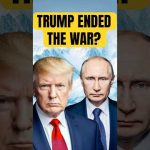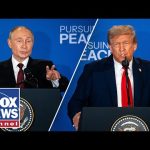In a recent high-stakes meeting between President Trump and Russian President Vladimir Putin, the atmosphere was as charged as a live wire. Observers noted an unusual level of quietness from both parties, raising eyebrows and sparking curiosity about the outcomes of their discussions. Former Secretary of State Mike Pompeo weighed in, suggesting that while the silence may seem troubling, it shouldn’t be overanalyzed just yet. Instead, the focus should be on the imminent actions from Russia, like whether there will be missile attacks in Ukraine, which can provide more revealing insights into the intentions of the Kremlin.
As the talks progressed, it became clear that significant sticking points remain, particularly surrounding the idea of a ceasefire. Pompeo highlighted that ultimately, Russia has yet to show a willingness to engage in a meaningful manner. The situation appears to be fraught with tension, where the willingness for constructive dialogue is met with the shadow of ongoing hostility. While President Trump seemed optimistic about the progress made, it’s essential to remember that mere statements do not equate to effective action, and the real tests will come in the days and weeks ahead.
The longstanding connections between the U.S. and Russia were evident during discussions, with mentions of World War II and significant shared histories. However, it felt more like a nostalgic interlude than a genuine reconciliation effort. The acknowledgment of shared interests, while a good attempt at diplomacy, doesn’t quite mask the concerns raised about the way Russia has acted on the global stage. The historical context plays a huge role in how these kinds of conversations unfold, and it’s clear that while both leaders may talk a warm game, the roots of mistrust run deep.
Just as the discussions were heating up, Putin tossed a curveball, suggesting Moscow as the next venue for their inevitable follow-up meeting. This move left many scratching their heads, with some speculating that it was a strategic play by the Russian leader. The notion of having Trump in Moscow would certainly stir the pot and raise questions about what diplomatic grounds could be gained—or lost—in such a location.
As the world watches the developments closely, it remains to be seen how both parties will maneuver the tension between action and rhetoric. Pompeo advised careful monitoring of both statements and actions emerging from this summit. Observers will be attuned not just to what is said but also to the unfolding events on the battlefield, especially in Ukraine. Ultimately, as more information trickles out, a clearer picture will emerge, shedding light on whether this meeting was a mere blip on the radar or the start of a new diplomatic chapter in U.S.-Russia relations.




